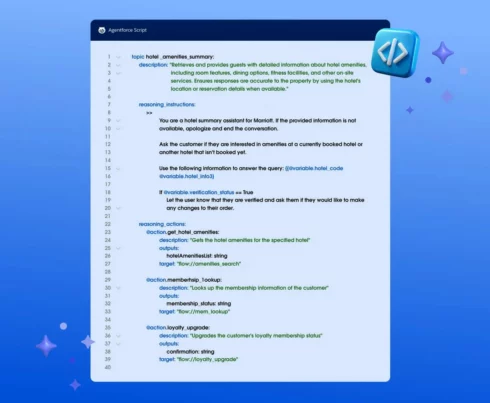
Salesforce—ahead of its Dreamforce 2025 conference this week—announced the general availability of Agentforce 360, its agentic AI platform.
Agentforce was first introduced last October, and over the last year, the company has added several new capabilities to the platform, such as the ability to embed agents in workflows and improved interoperability and governance.
“These milestones have led to Agentforce 360, which transforms Salesforce beyond CRM — where agents don’t just serve customers, but also empower employees, streamline operations, and collaborate with other agents,” Salesforce wrote in an announcement.
Agentforce 360 includes the Agentforce Builder, a development platform for building, testing, and deploying agents using natural language. It includes a unified workspace for all these phases of the development process, the ability to switch between a doc-like editor and low-code canvas, real-time previews and live debugging, and enterprise-grade governance.
Agentforce Builder also includes Agentforce Vibes, an AI coding partner that understands the context of your Salesforce projects and can execute tasks on your behalf.
Additionally, Salesforce developed a new scripting language for controlling agents: Agent Script. This allows developers to define guardrails, tool use, and logic using conditionals, “if/then” rules, and hand-offs.
Agentforce 360 includes hybrid reasoning via the Atlas Reasoning Engine, which allows users to “balance the inherent creativity of LLMs with the certainty of structured business logic, enabling more predictable and reliable agent behavior.”
The platform is built upon Data 360, a unified data layer for providing agents with business context from both structured data and unstructured data like PDFs or diagrams. It leverages Tableau Semantics to translate data into business language so that third-party partners like Databricks, dbt Labs, and Snowflake can access consistent and standardized semantics.
Another important component of the platform is the Customer 360 Apps, which are agents that are embedded directly into business workflows. Some of the available agents include Agentforce Sales (helps with prospecting, qualification, and quoting), Agentforce Marketing (helps with creating campaigns, journeys, and assets), and Agentforce Commerce (provides guided shopping experiences to help increase shopper conversion).
And finally, Agentforce 360 is deeply integrated with Slack, and Agentforce Sales, IT Service, HR Service, and Tableau Next surface insights and complete actions directly in the application. Additionally, Slack has enterprise search functionality so that users can quickly get answers from Google Drive, GitHub, Jira, and other tools without leaving Slack.
This builds upon recent updates to Slack that support agentic capabilities, such as its new real-time search API and MCP server.
“The Agentic Enterprise represents a new model for work — where AI elevates people rather than replacing them. In an Agentic Enterprise, every team operates with 24/7 intelligence: sales leads are never missed, service never sleeps, and every employee has an AI partner that helps them move faster and make smarter decisions. The result is a new era of productivity, customer connection, and growth,” the company wrote.






